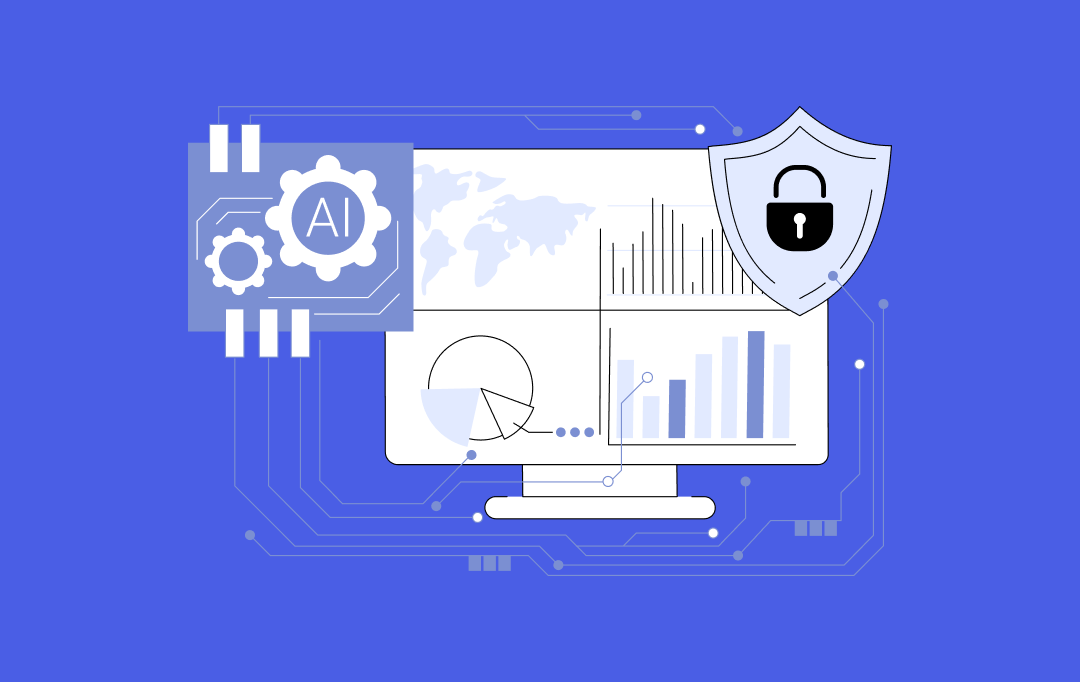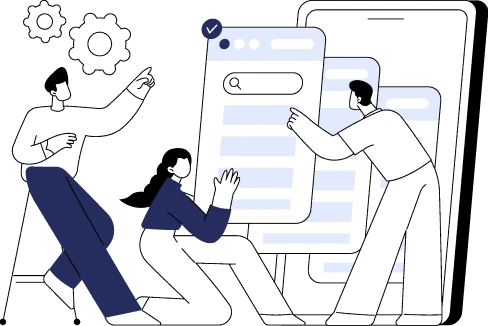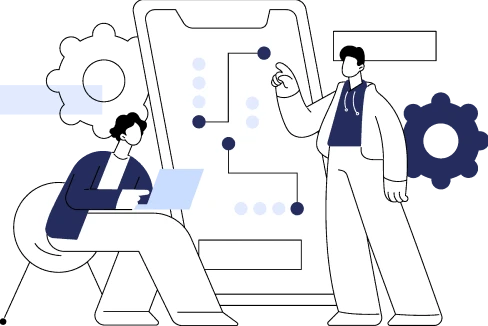- When Do Businesses Need Enterprise Applications?
- Types of Enterprise Mobile Applications (Based on Users)
- Employee Level
- Department Level
- Company Level
- Types of Enterprise Mobile Applications (Based on Functionality)
- Communication & Team Apps
- Customer Relationship Management (CRM) Apps
- Project & Task Management Apps
- Enterprise Resource Planning (ERP) Apps
- Business Intelligence (BI) & Analytics Apps
- Human Resource Management Apps
- Benefits of Enterprise Mobile App Development for Businesses
- Enhanced Data Security
- Increased Productivity
- Improved Communication
- Streamlined Operations
- Elevated Customer Experience
- Cost-Efficiency
- Real-Time Insights
- Adhering to Industry Standards
- Space to Expand and Adapt
- Core Features of an Enterprise Mobile App
- Security
- Scalability
- Integration with Enterprise Systems
- User Experience
- Analytics & Reporting
- Customization & Configuration
- Offline Access
- Cross-Platform Support
- Factors to Consider Before Enterprise Mobile Application Development
- Platform Selection
- Target Audience
- Mobile Analytics
- UI/UX Design
- Ensuring Security
- Stages of Enterprise Mobile App Development
- Define Business Goals
- Budget Estimation
- Technical Specifications
- Wireframe Prototype
- UI/UX Design
- Product Development
- Testing and Quality Assurance
- Maintenance and Updates
- Understanding the Enterprise Mobile App Development Cost
- What are the Most Successful Enterprise Apps in the Market?
- Trello
- MailChimp
- Slack
- Zoom
- The Future of Enterprise Applications: Trends Shaping the Digital Era
- Artificial Intelligence
- Blockchain
- Augmented and Virtual Reality
- Big Data Analytics
- Cloud Computing
- Microservices & API-First Building Architecture
- Low-Code/No-Code Development
- How Can Appinventiv Help Your Enterprise Achieve Business Agility?
- FAQs
Key takeaways:
- Enterprise mobile app development focuses on building expandable, protected, and high-performing solutions made for enterprises and worldwide organizations.
- Enterprise apps usually fit into four main groups: work process management, team cooperation, business intelligence & data analysis, and cloud-based file storage systems.
- The advantages of enterprise applications cover quicker employee setup, smoother work processes, unified management, better data handling, and live performance monitoring.
From shipping companies like FedEx tracking packages instantly to coffee chains like Starbucks letting you order ahead and earn rewards, enterprise mobile apps are making actual improvements in how things get done and how engaged people feel.
Every tap, swipe, and notification determines how companies succeed or fail in today’s market. The worldwide enterprise mobile app development industry is exploding, expected to hit $73.89 billion by 2032, as businesses invest in apps that bring teams together, streamline workflows, and create amazing experiences for their employees and customers. (Source: Market Research Future).
The enterprise app development market is booming as industries rush to improve productivity and embrace technology changes. From cloud-based ERP and intelligent CRM to advanced information analysis, businesses are investing in tools that simplify complicated operations and create new growth opportunities.
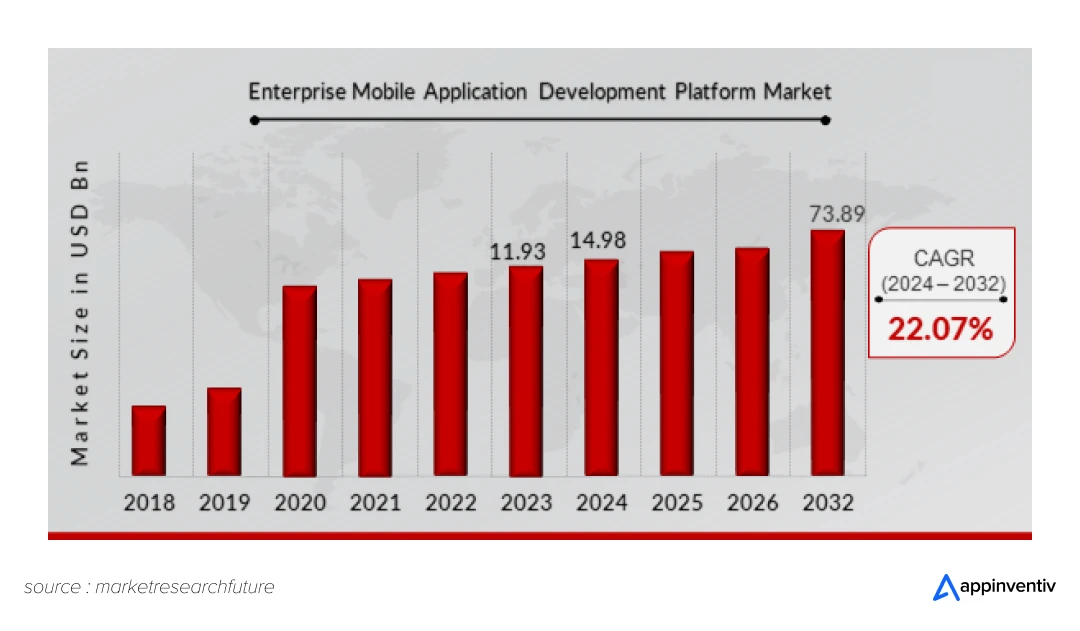
With sectors like banking, healthcare, retail, and manufacturing handling enormous amounts of data and intricate workflows, the desire for smarter, scalable enterprise solutions has never been stronger.
Outside daily operations, enterprise apps make remote work possible, provide clear visibility into supply chains, and spark new ideas through AI, data analysis, and custom services. Banks, financial startups, and field service companies are using enterprise mobile apps to share quick insights, handle routine tasks automatically, and stand out from competitors.
This blog explores everything about enterprise mobile app development, including different app types, how to build them, what they cost, and their main advantages. We will overall analyze how enterprise mobile apps are changing business, pushing digital transformation forward, and helping organizations become more flexible, scalable, and competitive in our increasingly mobile world.
Transform employee productivity and safeguard data with an enterprise app built for your business.
When Do Businesses Need Enterprise Applications?
Enterprise app development becomes necessary when regular tools, ready-made software, or older systems can’t handle what your business needs anymore. Custom apps are the answer when you want to grow smoothly, keep customers satisfied, or update your processes to stay ahead in a quickly changing market.
Here are the main situations that require enterprise app development:
- Growing your operations: When you have more users, transactions, and data than before, custom enterprise apps keep everything running smoothly without slowdowns.
- Keeping customers satisfied: Personal, smooth interactions keep customers coming back and choosing you over competitors.
- Making work easier: Automating boring tasks and helping teams work together better gets more done with fewer mistakes.
- Updating old systems: Cloud-based apps replace stiff, outdated systems and give you room to adapt as you grow.
- Adding smart features: Building AI into your apps can handle routine work automatically, predict what might happen next, and speed up service, keeping you ahead of the competition.
In short, enterprise app development equips your organization with the tools it needs to grow smarter, work faster, and stay competitive in a constantly evolving market. With the rise of enterprise mobility, organizations must adopt an enterprise cybersecurity risk management approach that addresses mobile-specific threats, third-party integrations, and distributed workforce vulnerabilities across their digital ecosystem.
Types of Enterprise Mobile Applications (Based on Users)
Multiple types of enterprise apps for business growth are available at different organizational levels and serve distinct purposes while contributing to the smooth functioning of an enterprise.
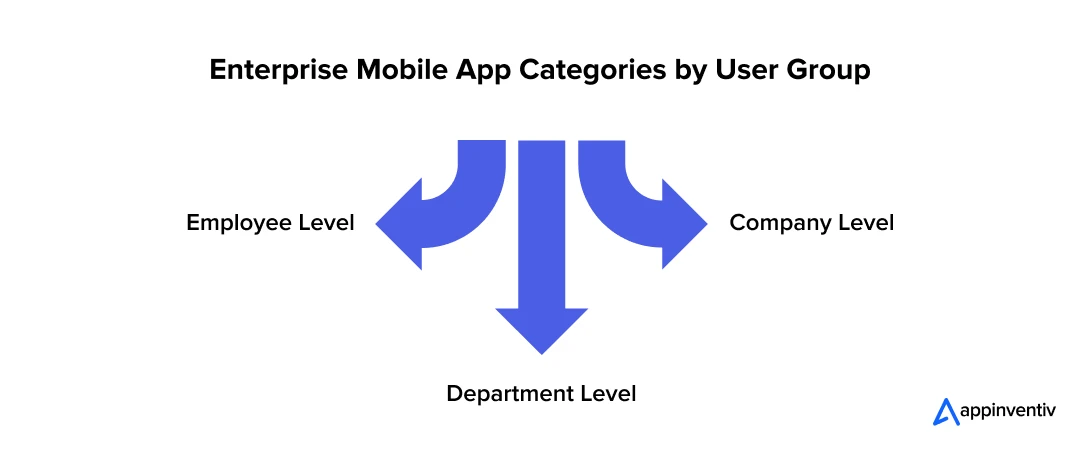
Employee Level
At the employee level, enterprise mobile apps are designed to assist individual employees in their daily tasks and responsibilities. These tools help enhance personal productivity and efficiency.
Example: A daily expense tracking app lets employees easily log and manage their business-related expenses. They can look at the receipts, categorize expenses, and create expense reports. This app streamlines the overall expenses and ensures accurate financial records for both employees and the finance department.
Department Level
At the department level, enterprise apps cater to the specific needs of a particular functional area within the organization. These tools facilitate collaboration, coordination, and task management within the department.
Example: Project management software helps multiple organizational departments organize tasks, assign responsibilities, set deadlines, and track overall operational progress. For instance, a marketing department might use this type of software to plan and execute marketing campaigns, allocate resources, and monitor campaign milestones.
Company Level
At the company level, enterprise apps offer comprehensive solutions integrating various departments and functions, supporting overall organizational operations and decision-making.
Example: An ERP system is a unified platform that integrates core business processes like finance, HR, inventory, and customer relationship management. This makes way for seamless data flow and collaboration across departments. Companies can use an ERP system to manage financial transactions, procurement, employee records, customer orders, etc.
Types of Enterprise Mobile Applications (Based on Functionality)
Enterprise mobile apps are created to handle various company needs based on what they do. From making work processes better to keeping customers more interested, each kind of app tackles a particular company goal while helping with overall growth and productivity. Picking the right app type helps businesses get the most value from their investment and smooth out their operations successfully.
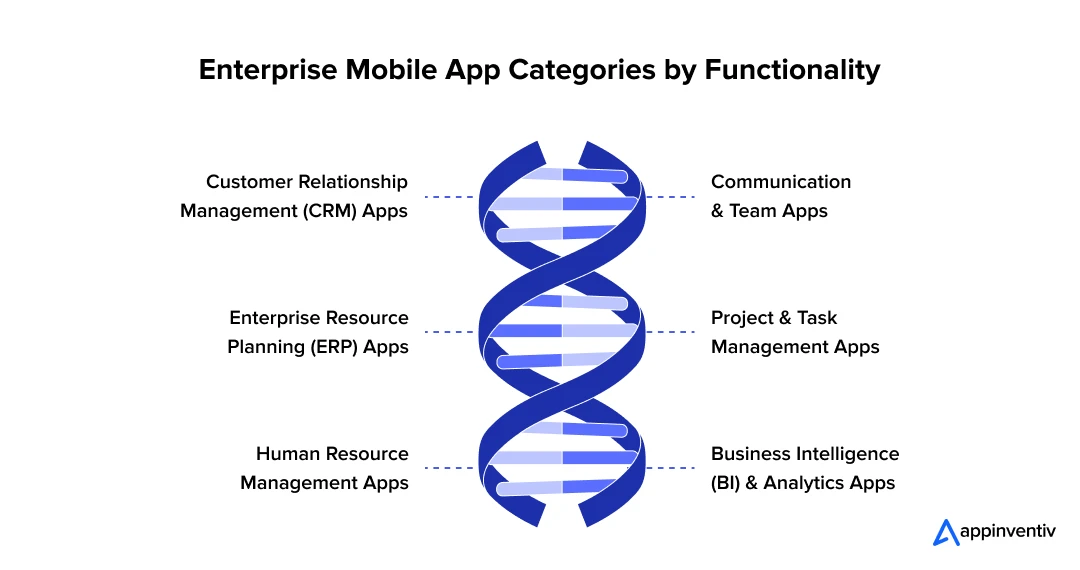
Communication & Team Apps
At the communication level, these apps keep teams connected, no matter which time zones they are working. They make workplace conversations flow better and help different departments collaborate without headaches.
Example: Apps like Microsoft Teams / Slack let people chat, share documents, have video meetings, and work together right now. Teams can create special areas for projects, reducing email mess and making decisions faster.
Customer Relationship Management (CRM) Apps
At the client level, CRM apps help businesses manage relationships and dealings with customers more successfully. They give sales and support people what they need to offer personal service and build loyalty.
Example: Platforms like Salesforce / Zoho CRM provide phone access to customer details, sales leads, and help requests. Salespeople can track potential buyers, update deal progress, and respond to customer questions immediately, building stronger relationships.
Project & Task Management Apps
At the department level, project management apps help teams organize jobs, assign duties, and track project progress. They boost transparency and responsibility within departments and across them.
Example: Platforms like Asana / Jira allow bosses to set targets, distribute jobs, and watch project movement as it unfolds. Areas like marketing or IT can use them to streamline promotions, work sprints, or product launches.
Enterprise Resource Planning (ERP) Apps
At the full organization level, ERP apps combine various business operations into one unified system. They break down departmental silos, keeping operations aligned and data consistent across the organization.
Example: SAP / Oracle ERP systems combine finance, HR, inventory, supply chain, and customer management in a single application. This helps businesses use such ERP apps to process financial transactions automatically, maintain employee records, and simplify purchasing with precise, current information.
Business Intelligence (BI) & Analytics Apps
At the management level, BI and analytics apps provide decision makers with rapid access to valuable insights they can really use. They convert complex data into simple dashboards, reports, and picture displays.
Example: Through Power BI / Tableau Mobile, enterprise leaders can review important performance figures, examine trends, and observe key measurements directly on their phones. This allows them to make informed decisions and implement company plans across the organization.
Human Resource Management Apps
At the worker management level, HR apps streamline people-related processes, making HR operations clearer and simpler for everyone to access.
Example: Apps like Workday / BambooHR enable employees to manage their leaves, attendances, and complete training programs, while HR groups can track attendance, manage performance evaluations, and maintain rule compliance, all using one app.
Benefits of Enterprise Mobile App Development for Businesses
From fortifying data security and increasing overall productivity to fostering seamless communication and revolutionizing customer experiences, the power of tailored enterprise mobile app development services can reshape how modern business practices and get maximum ROI:
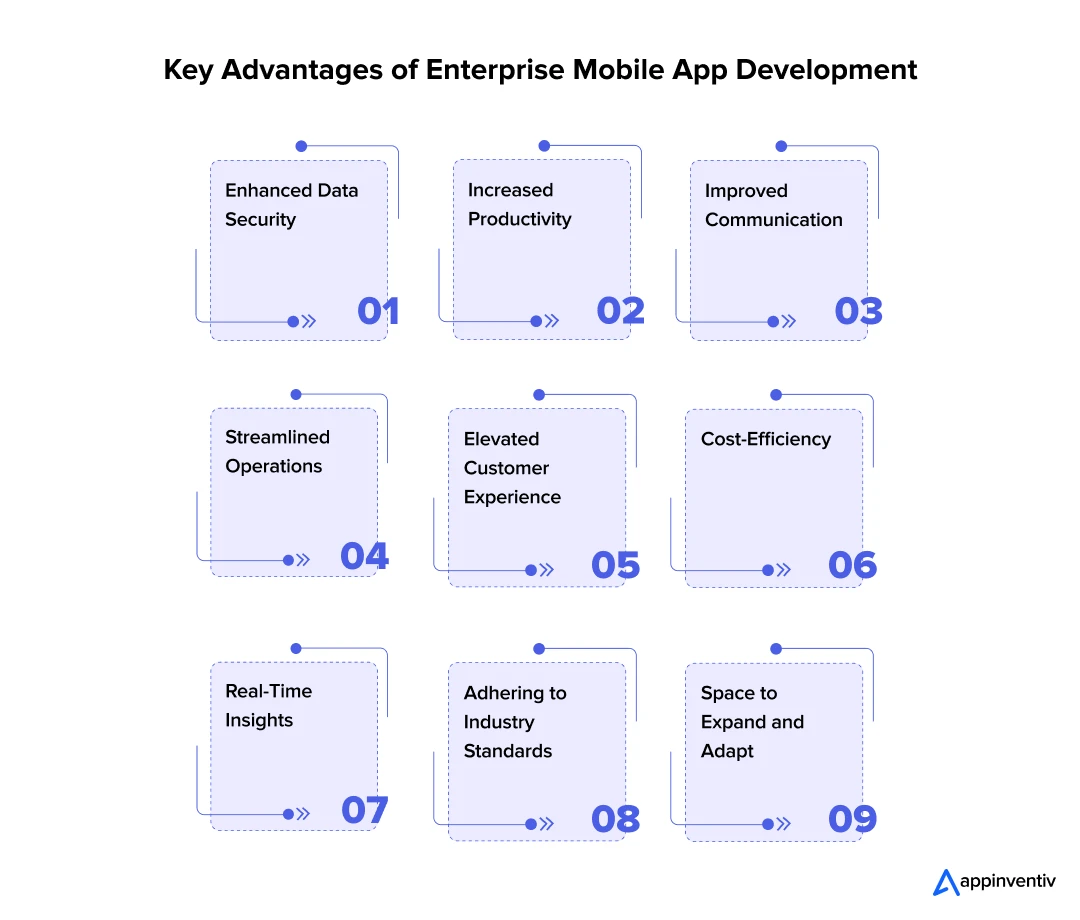
Enhanced Data Security
Enterprise mobile apps build stronger security by using multiple protective layers like data scrambling, safe connection methods, multi-factor authentication, and user permission systems. These safety features keep important company files, customer records, and special business methods protected from online criminals, information theft, and unauthorized individuals.
This thorough security approach helps businesses follow industry rules while earning confidence from clients and partners who depend on careful handling of their private information.
Increased Productivity
When workers can reach project management systems, customer tracking tools, and job monitoring features directly from their phones, they choose solutions quickly and finish tasks more effectively. This reduces waiting periods, removes boring, repeated work, and keeps teams focused on valuable activities that really push the company ahead.
Employees can refresh information, review updates, and handle urgent issues without staying at their computers, so projects continue progressing even when people are traveling or working from home.
Improved Communication
Enterprise mobile apps build smooth conversation paths for both company teams and outside partners through quick messaging, video conferences, group discussions, and shared work displays.
Teams stay linked and ready to respond regardless of their work area or physical location. This improved coordination creates quicker problem resolution, stronger teamwork, and more involved employees who feel connected to their coworkers and business objectives.
Streamlined Operations
When you handle boring repeat tasks automatically, switch paper forms to digital versions, and link up how different departments work together, enterprise apps reduce human slip-ups and cut down on paperwork hassles. This keeps work running consistently well, makes it smoother to hand off projects between teams, and speeds up completion times.
What you get are business processes that bend with changes and keep going without getting bogged down in red tape. Workers spend less time doing tedious office tasks and more time on stuff that really helps the company grow.
Elevated Customer Experience
Enterprise mobile apps create customized, immediate connections by letting customers reach their account information, support features, and do-it-yourself options directly. People solve their problems quickly, handle purchases more easily, and get useful updates before troubles even start.
This creates stronger customer loyalty, better satisfaction scores, and keeps people choosing you for years rather than jumping to other companies. When customers can take care of routine stuff themselves, they feel more empowered while your help team tackles trickier situations.
Cost-Efficiency
By using available resources better, handling routine work automatically, and getting rid of repeated efforts across departments, enterprise apps generate real money savings. Companies see good returns on their technology spending over time, pay less for manual work, and can shift resources toward important projects that actually speed up company growth. This turns technology spending from a required expense into a profitable investment.
Real-Time Insights
Enterprise mobile apps let you see control panels, data breakdown tools, and performance tracking right away, so managers can watch key business numbers as they change. This helps you make good decisions using current facts, quickly adjust how work gets done when necessary, and plan future moves using trustworthy, recent information.
Rather than waiting for monthly summaries or quarterly updates, leaders can notice patterns, catch issues early, and grab opportunities the moment they show up.
Adhering to Industry Standards
Many enterprise apps come with built-in rule tracking and automatic report-building features, helping companies stick to industry compliance and protect customer details correctly. Electronic record keeping, safe document storage, and automatic policy monitoring reduce the risk of rule breaking and protect the company from legal problems and costly fines.
This matters especially for businesses in healthcare, banking, or other tightly watched industries where one slip-up can cost millions. The apps take care of boring compliance tasks automatically, so your people can concentrate on helping customers rather than stressing about paperwork and inspections.
Space to Expand and Adapt
Business mobile apps are created to grow with your company, managing more users, larger amounts of data, and new integrations with other programs. This bendability lets companies adjust quickly when markets change, expand their work, and bring in new methods without scrapping everything they currently use.
Whether you’re opening new spots, bringing on more workers, or starting different services, the apps can stretch to handle these changes without falling apart or slowing down your operations.
Core Features of an Enterprise Mobile App
Here are the multiple features that come together to build a robust enterprise mobile app. In order to ensure that your app functions seamlessly, it is advisable to partner with a dedicated app development firm that can help you integrate the best-in-class features that further guarantee maximum operational efficiency and ROI.

Security
Security is crucial for safeguarding enterprise data. It is important to have comprehensive encryption, password protection, and meticulous user authentication mechanisms. These measures ensure data integrity and protect against potential threats.
Scalability
Enterprise applications must possess the capability to adapt to changing business needs. This includes effectively managing larger user bases, handling growing amounts of data, and incorporating new functionalities. By doing so, these applications can effectively support a company’s growth trajectory.
Integration with Enterprise Systems
Effective communication with existing systems and infrastructure is crucial for any app. The ability to interact with established databases, access data, and utilize APIs is essential. Smooth synchronization with systems like ERP or CRM greatly improves operational efficiency.
User Experience
Creating a positive user experience relies on keeping things simple and easy to understand. Making the app friendly, helping users move around easily, and making interactions smooth ensures the app is easy to use and navigate.
Analytics & Reporting
Equipping apps with analytics and reporting gives enterprises valuable insights into user engagement, usage patterns, and key metrics. This data-driven approach enables informed decision-making and enhances mobile strategies.
Customization & Configuration
It is very important to give businesses the freedom to customize the app according to their special needs. Changing things like fields and reports, and adding other services from outside sources makes the app fit perfectly for what each business wants to do.
Offline Access
Enabling offline usability is crucial for uninterrupted app usage. This feature allows the app to function without an internet connection, reducing data usage and cost concerns.
Cross-Platform Support
Cross-platform support is essential for enhancing accessibility and reaching a diverse user base. Enterprises can provide a seamless experience across different devices by ensuring compatibility across various platforms.
Factors to Consider Before Enterprise Mobile Application Development
Before starting custom enterprise mobile app development, there are a few things to consider. While a well-trained team can assist in the effective integration, you should be aware of these key aspects before launching a mobile enterprise app:
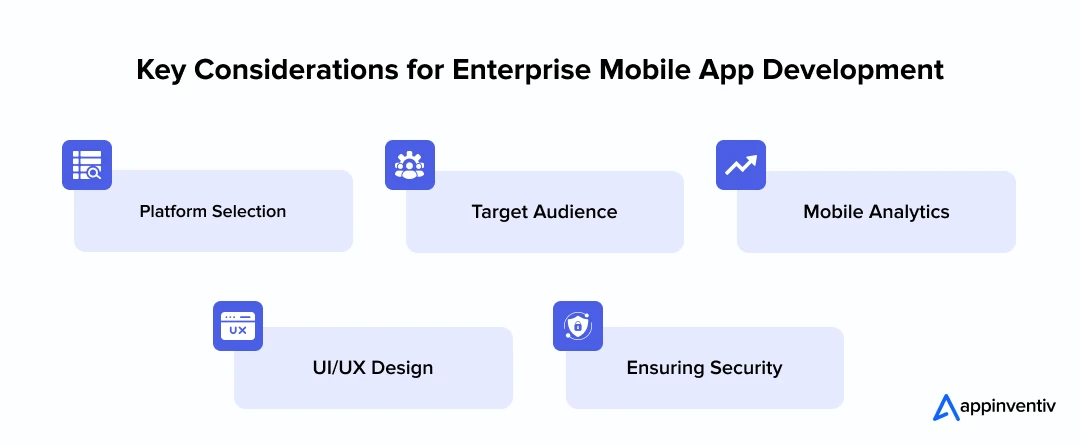
Platform Selection
This is the first stage of mobile enterprise app development. The platform you choose impacts the remaining features of enterprise applications. In this situation, if you get an app designed, try to maximize its reach. Apple’s iOS and Google’s Android are currently the most popular systems.
Target Audience
Understanding the consumer base is one of the most important elements entrepreneurs must consider before developing their enterprise application. When initiating enterprise iOS app development, details like the consumers using the app, their age range, and the country you aim to target are critical.
Mobile Analytics
The analytics tool helps determine the capabilities and features of your app. It impacts important elements, including user engagement with certain events, while also assisting in user retention. Brands can use analytics to improve the app’s overall performance. Users’ individual functionality needs and preferences can be determined through careful study. Mobile analytics allows you to save data and use it wisely to improve your app’s speed and efficiency.
UI/UX Design
Your UX reflects your business and portrays you to prospects and consumers. In the future, it is vital to understand that your UI and UX are intertwined. Mobile app developers must be able to offer incredible user interaction and experience with just a few clicks to the app users. An interactive UI/UX is a blessing for developers & organizations alike.
Ensuring Security
When firms enter into enterprise Android app development, having a robust security system that protects users’ sensitive and private data is critical. It’s much more important when your software involves monetary transactions. Users’ data is becoming increasingly precious these days, demanding a capable and dependable system to store and protect it.
Stages of Enterprise Mobile App Development
The enterprise mobile app development process is complex, but a well-structured plan can help you achieve exceptional results. Each stage builds on the previous one, ensuring that the final product is both scalable and aligned with business goals. Let’s break down the process into easy steps:

Define Business Goals
This step involves initiating the enterprise mobile app journey by pinpointing the specific issue to be addressed, whether improved employee communication or streamlined supply chain management. During this stage, the development team will identify challenges, clarify the app’s purpose, and help you understand the core features.
Budget Estimation
During this stage, conduct thorough research and gather cost estimates from an experienced app development company that can help you identify potential costs, ensuring efficient resource utilization for development, design, testing, and deployment. This approach empowers informed decision-making and a well-defined budget framework.
Technical Specifications
During this stage of development, your development partner should provide a detailed plan, including the enterprise mobile app tech stack, the underlying app platforms (Android, iOS), wireframes, and technical requirements.
Wireframe Prototype
This stage involves creating the wireframe prototype, a visual blueprint that aligns the app’s direction with your business vision. It represents the app’s layout, functionality, and user interactions, allowing for early validation and refinement before full-scale development.
UI/UX Design
During this stage, the development team focuses on user interface and experience, making the app appealing and user-friendly. The primary objective is to create an app that functions seamlessly and resonates with the brand’s essence interactively.
Product Development
The development team works closely with you during this stage to address the technical details and nuances. They skillfully handle technical intricacies, configuring databases, integrating APIs, and implementing features as per the design.
Testing and Quality Assurance
In this stage, the quality assurance process for the enterprise mobile app development platform ensures that the app functions flawlessly. It is vital to involve end-users in the testing processes during the development of enterprise mobile apps to yield valuable insights.
Maintenance and Updates
After launching the app on the desired platform, it is time to focus on the post-release maintenance and upgrades. This stage of mobile enterprise app development involves collecting user feedback, rectifying bugs or errors, and ensuring optimal app performance across multiple operating systems and platforms.
Let’s simplify the process and deliver a solution built for scale and success.
Understanding the Enterprise Mobile App Development Cost
To give you a rough idea, the cost of mobile app development for enterprise can vary from $50,000 to $300,000. Several factors can impact the overall cost of development, such as the app’s UI/UX design, the features to be integrated into the app, the location of the hired enterprise mobile application development firm, the maintenance and quality assurance required, the overall delivery time frame, etc.
In simple terms, the cost of creating an enterprise mobile app directly depends on the overall complexity of the app. For instance, a highly complex app with an extensive feature list will ultimately cost you more compared to one with a simple interface and a minimal feature list.
| Type of mobile app development for enterprise | Enterprise mobile app development cost | Time frame |
|---|---|---|
| Simple | $50,000 to $85,000 | 3 to 6 months |
| Medium Complex | $90,000 to $200,000 | 7 to 8 months |
| Highly Complex | $220,000 to $300,000 | 9 to 12 months |
What are the Most Successful Enterprise Apps in the Market?
Succeeding in enterprise app development is a rewarding journey that demands dedication and effort. While there may be challenges associated with creating a top-charting app, the overall industry expertise of your app development firm can eventually help you succeed. In fact, there are remarkable enterprise mobile app development examples crafted by proficient enterprise application development companies that have achieved remarkable success in the market. Let’s take a look at them below:

Trello
Trello is a web-based application that allows users to organize their work. Trello is used for organizing tasks for yourself or with your team. It lets you create lists and flag the tasks in different colors. With every activity on the Trello board, all the members are notified immediately, which makes keeping up with the task quite easy.
MailChimp
You probably would have heard of MailChimp before. It was one of the earliest and easiest ways to create an email for people without any technical background. The UI of MailChimp is constantly being worked on to continue to give great service. This marketing platform is a great tool for small businesses.
Slack
Slack has become the quickest-growing workplace app out there. The user experience feels great, with cheerful messages and helpful notifications popping up. It’s become one of the top choices for companies everywhere. More than just chatting, Slack connects with hundreds of other programs like Google Drive, Jira, and Salesforce, bringing all your work into one place.
Zoom
Zoom is one of the preferred applications that is free, and individuals can connect across the globe at any time as long as the application is downloaded and running on a smartphone, PC, tablet, or laptop. Zoom is used for communications purposes, such as meetings, webinars, etc, by many of the successful businesses.
In addition to several up-and-coming enterprise applications, these apps have set the domain on a path of unprecedented growth. Here are the trends that we can presume are shaping the space further in the coming years.
The Future of Enterprise Applications: Trends Shaping the Digital Era
The demand for mobile enterprise app development is rapidly increasing, driving business growth for those who adopt these solutions. This trend signals a promising future for enterprise app development. Data-driven approaches and staying updated with technology trends can help you ensure business success in this dynamic landscape. Let us look at the multiple trends that will dominate the enterprise apps of the future:
Artificial Intelligence
The role of AI in businesses goes beyond an improvement in customer experience. On the business front, technology can affect almost all domains – HR, Marketing, Operations, and Finance. We have explored the use cases of AI across different job roles extensively in this article – How AI Carries an Impact On Your Business, Across Domains?
Blockchain
No matter the industry, Blockchain is driving powerful transformation, and enterprises are no exception. From streamlining supply chain management and strengthening security to enabling transparent payments and smarter hiring processes, businesses have multiple opportunities to use blockchain for real impact.
Augmented and Virtual Reality
By helping employees explore the intricacies of their job virtually, AR/VR technology has been making complex work processes interactive for some years now. Through its working model, the technology combination is proving to be a game-changer in the training and development domain.
Big Data Analytics
The rise in data has emphasized the need for efficient organization and processing. Businesses are implementing advanced analytics and data management methods to speed up operations and facilitate quicker, more informed decision-making.
Cloud Computing
Cloud computing will continue to evolve at a rapid pace, adapting to users’ changing needs and expectations. As a result, numerous industries’ functionalities would be improved. When embracing digital transformation, shifting to the cloud is important and the most practical technique for analyzing data for businesses. However, such transfers are accompanied by changing expectations, necessitating the use of cutting-edge cloud technology as well as upgraded and powerful security features.
Microservices & API-First Building Architecture
Traditional monolithic apps are being replaced by microservice architecture that boosts growth potential, resilience, and quick changes. Starting with APIs first lets companies connect with outside tools smoothly, supporting faster new ideas and piece-by-piece expansion of what the business can do.
Low-Code/No-Code Development
Easy-to-use building platforms are opening up app creation to everyone, letting business people build and improve solutions quickly without needing deep tech knowledge. The low-code development process speeds up the market launch time and reduces the need for IT support, making innovation easier to reach throughout the company.
How Can Appinventiv Help Your Enterprise Achieve Business Agility?
Appinventiv has a skilled in-house team of expert developers who specialize in delivering sophisticated enterprise mobile application development services customized to your business niche. We deliver comprehensive solutions with essential features and capabilities to ensure your app aligns seamlessly with your enterprise objectives.
Our development team are experienced in integrating a wide range of features and capabilities to enhance the functionality and user experience of your enterprise mobile app development.
We recently helped the world’s finest furniture retailer IKEA, deliver a robust ERP solution that is now available across 7+ brand stores across the UAE. The custom solution integrated into the in-store kiosks allows the retailer to refine its customer onboarding process, product exploration, and data-driven marketing.

With a team of over 1600 tech experts and awards from Clutch Global, we have a solid history of creating enterprise apps that tackle current problems while getting businesses ready for future opportunities.
Working with Appinventiv means embracing flexibility, strength, and growth through modern enterprise mobile app development.
Contact us for a professional consultation on your enterprise app development project.
FAQs
Q. How can a custom enterprise mobile app improve operational efficiency?
A. A tailored enterprise app can help you improve your business operations and customer service. You can also gain an advantage over the competition by speeding up the enterprise mobile application development processes and generating more revenue.
Q. How can large language models (LLMs) enhance enterprise mobile app functionality?
A. Large language models are changing how enterprise mobile apps work by letting you have actual conversations with them instead of clicking through menus. They power smarter chatbots, give relevant suggestions, and let you search company data using everyday language.
They also handle the tedious stuff like summarizing reports, understanding customer feedback, and supporting voice commands that actually work. This means less time fighting with apps and more time being productive. Companies get personalized experiences while making better use of LLM data.
Q. What is the future role of AI in enterprise mobility?
A. AI in enterprise mobility will make apps work way smarter by predicting what you need before you ask. Your apps will learn how you work and automatically adjust to help you get things done faster.
Security will get better at identifying problems early, interfaces will adapt to your preferences, and notifications will actually be useful instead of annoying. Companies will see teams work more efficiently, customers stay more engaged, and resources go where they’re needed most. AI-powered enterprise apps are evolving beyond simple learning tools to become intelligent assistants that intuitively understand user needs.
Q. How much does enterprise mobile app development cost?
A. Enterprise mobile app development costs depend on how complicated your project gets and what you want to build into it. Basic apps typically run between $50,000 and $100,000, but if you need something with AI capabilities, IoT connections, or complex backend systems across multiple platforms, you’re looking at $250,000 to $500,000 or more.
Don’t forget about the regular expenses either. Keeping apps updated, secure, and running well means ongoing costs. Things like custom interface design, making sure everything performs under heavy use, and meeting industry regulations all affect your final budget.
Smart cost management comes down to thorough upfront planning, understanding exactly what you need, and using flexible development methods. This approach helps you build apps that can grow with your business while staying within reasonable spending limits.
Q. What are the best practices for securing enterprise mobile apps?
A. Here are some of the best practices for securing enterprise mobile applications:
- Set up complete encryption for all your data, whether it’s moving around or stored somewhere.
- Use strong login methods like multi-factor authentication to keep unwanted visitors out.
- Set up permission levels so people only see what they need for their job.
- Run regular security checks, test for weak spots, and review your code frequently.
- Keep your software libraries current to close any security gaps.
- Build secure APIs that include speed limits, monitoring, and thorough data checking.
- Train your team on good habits like creating strong passwords and keeping them safe.
- Add threat monitoring tools that watch for new security risks around the clock.


- In just 2 mins you will get a response
- Your idea is 100% protected by our Non Disclosure Agreement.
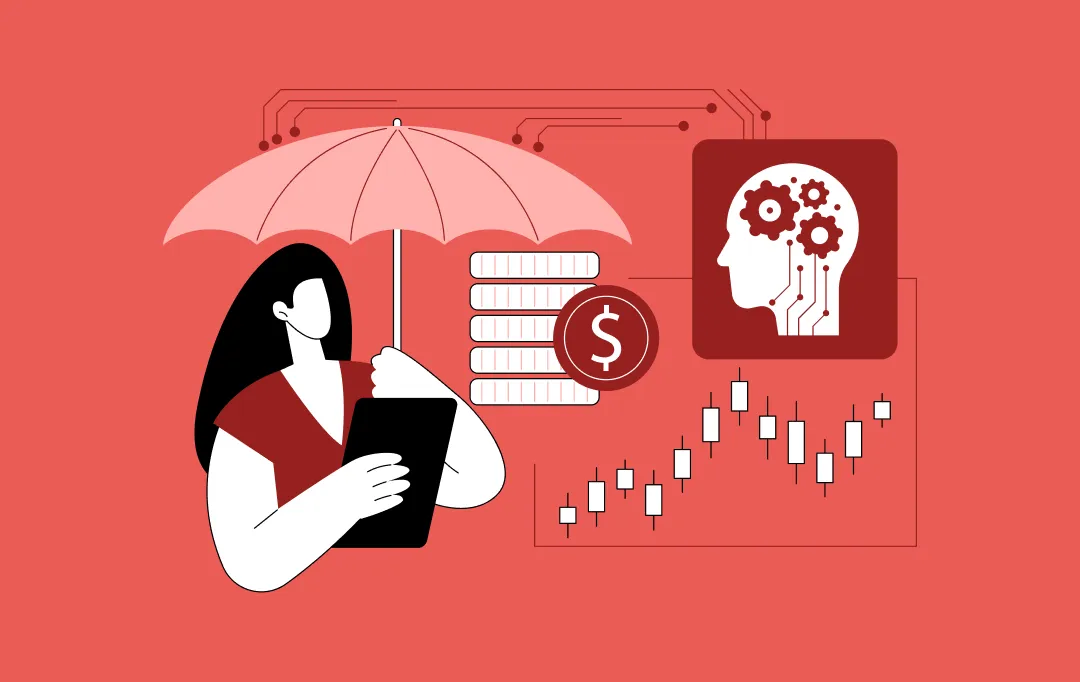
Enterprise Risk Management Strategies for Complex Business Environments
Key Takeaways Enterprise risk management is shifting from periodic reporting toward continuous operational risk visibility. Integrated risk data improves decision speed, readiness for compliance, and overall business resilience. Governance alignment and data integration strengthen the effectiveness of enterprise risk management in complex environments. Industry-specific ERM approaches help address regulatory, operational, and technology-driven risk exposure. Structured…

Turning Legacy Data into Business Intelligence: A Food Chain’s Success Story
When you walk into a food outlet and place an order, it looks simple: swipe your card, grab your meal, and go. But behind every order lies a stream of valuable data. Now, imagine this happening across hundreds of stores spread across multiple countries, with each outlet running several POS (Point of Sale) systems. That’s…
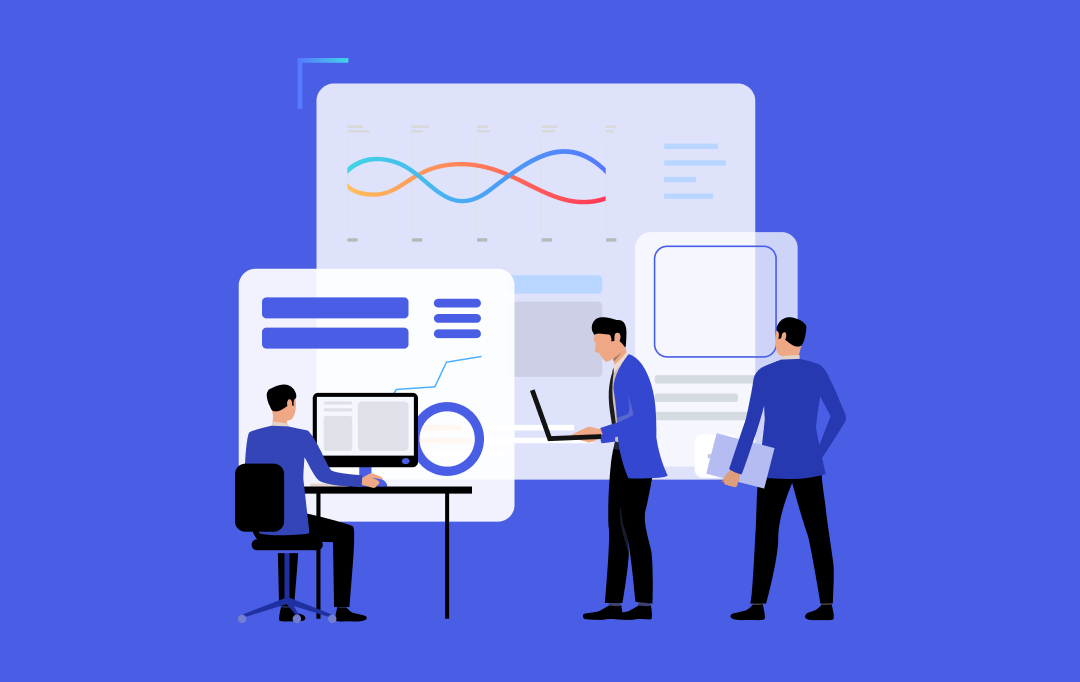
Building a Robust Enterprise Data Strategy - Benefits, Use Cases, Process, Costs & Best Practices
Key takeaways: A solid enterprise data strategy removes silos, reduces costs, and restores confidence in decisions. AI initiatives only succeed when built on reliable, well-governed enterprise data foundations. Executives, employees, and customers gain through faster insights and personalized experiences. The roadmap starts with goal alignment, audits, future vision, and phased execution. Industries see measurable ROI:…





















